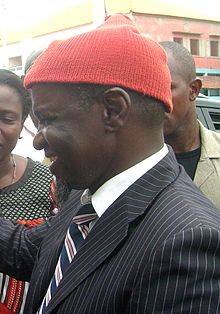Mohamed Ialá Embaló
| Kumba Ialá | |
|---|---|
 |
|
| President of Guinea-Bissau | |
|
In office 17 February 2000 – 14 September 2003 |
|
| Prime Minister |
Caetano N'Tchama Faustino Imbali Alamara Nhassé Mário Pires |
| Preceded by | Malam Bacai Sanhá (Acting) |
| Succeeded by | Veríssimo Correia Seabra (Chairman of the Military Committee for the Restoration of Constitutional and Democratic Order) |
| Personal details | |
| Born |
15 March 1953 Bula, Portuguese Guinea |
| Died | 4 April 2014 (aged 61) Bissau, Guinea-Bissau |
| Political party |
African Party for the Independence of Guinea and Cape Verde (Before 1992) Party for Social Renewal (1992–2014) |
| Alma mater | Catholic University of Portugal, Lisbon |
Kumba Ialá, also spelled Yalá (15 March 1953 – 4 April 2014), was a Bissau-Guinean politician who was president from 17 February 2000 until he was deposed in a bloodless military coup on 14 September 2003. He belonged to the Balanta ethnic group and was President of the Social Renewal Party (PRS). In 2008 he converted to Islam and took the name Mohamed Ialá Embaló. He was the founder of the Party for Social Renewal. In 2014, Ialá died from a cardiopulmonary arrest.
Born to a farming family in Bula, Cacheu Region on 15 March 1953, Ialá became a militant member of the African Party for the Independence of Guinea and Cape Verde (PAIGC) during his teenage years. The PAIGC sought independence from Portuguese colonial rule.
He studied theology at the Catholic University in Lisbon, Portugal and later studied philosophy. In Bissau, Ialá studied law. He spoke Portuguese, Crioulo, Spanish, French and English and could read Latin, Greek and Hebrew. After completing his education, he worked as a philosophy teacher.
Ialá was the head of a PAIGC delegation to Moscow in honor of the 70th anniversary of the 1917 Bolshevik Revolution, but in 1989 he was expelled from the party for demanding greater democratic reform.
...
Wikipedia
